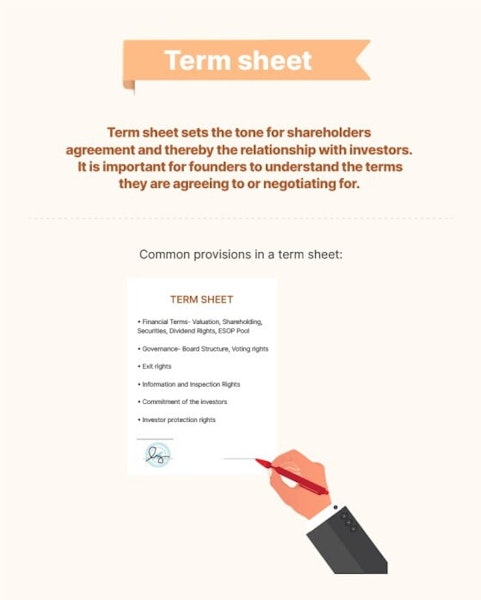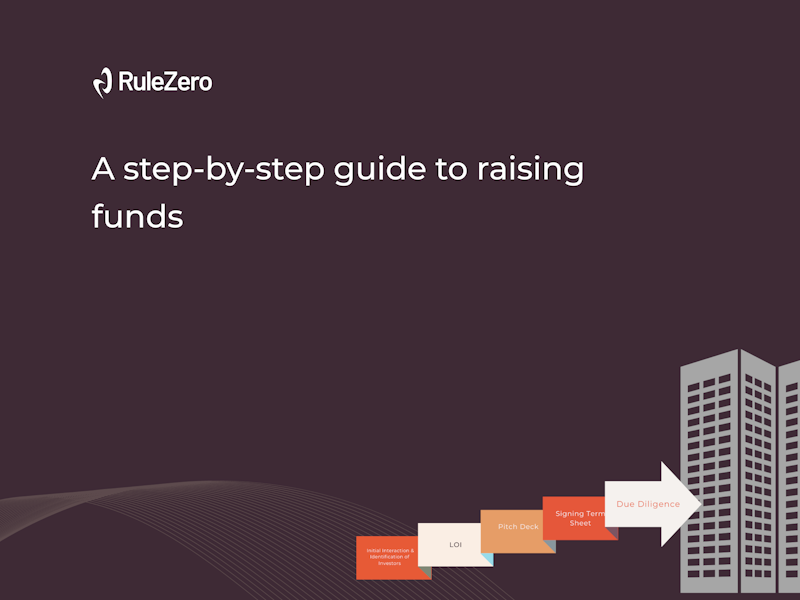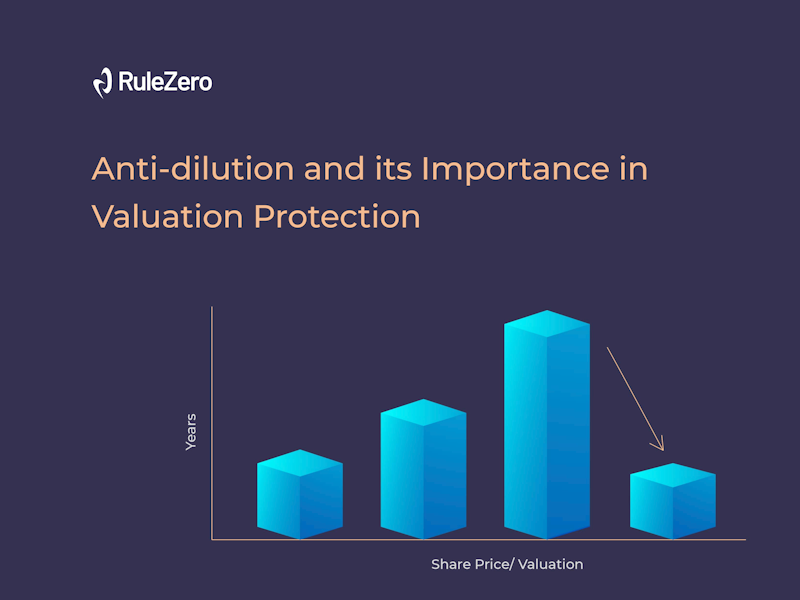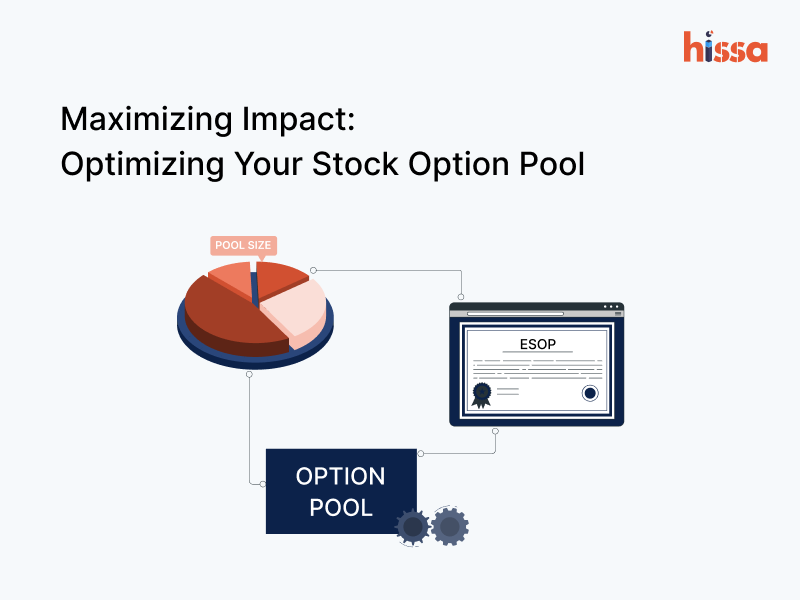Once the company is incorporated, it has to be nurtured from time to time. This is most essential to climb the success ladder and requires capital investment.
Initially, the founders and the founders’ networks (usually, family and friends) bring in the capital. But as the company starts to grow, looking for outside investors becomes the need of the hour as the funding amount is huge.
This article gives you a brief idea of the procedural aspects of raising funds from choosing an investor to finally closing the funding deal
What are the common steps that entrepreneurs go through when raising a round of funding?
1. Initial Interaction & Identification of Investors
It is crucial to set the terms carefully while negotiating a term sheet as it forms the foundation on which future binding agreements of the company are built upon. It’s important to understand the terms and be cautious about what you sign.
2. Execution of Letter of Intent (LOI)
The LOI expresses the company’s interest in meeting with a potential investor to discuss further on the business proposal. The LOI mainly describes the nature and structure of the proposal, the business model, financial terms and other related information that investors would be interested to know to understand the business. If the investors want to know more, then the Company can broadcast to the investor a brief presentation about the business, what will be brought to the table and what is in it for them.
3. Pitch Deck
To put it simply, an investment pitch deck is a presentation given by the founders to the investors that mostly talks about the company’s vision, product, target customers, target market, the team, cap table etc. It is the starting and most important point to the investors for the investment deal. From this, investors get a preliminary idea of what the Company does and how the funds will be utilized. As important as it is, while pitching the proposal, make sure not to include Company sensitive information in the pitch for confidentiality reasons.
It’s important to keep in mind that securing investment for your business is a process that takes time and effort. Expect to meet with investors multiple times before a deal is finalized. During these meetings, it’s crucial to not only present your company details, but also to showcase the qualities of the founders and team who will be responsible for executing the vision. Remember that investors have experience in evaluating risks and opportunities, so having a strong pitch is key to capturing their interest. The success of your initial meeting will determine if a follow-up meeting will be scheduled.
Read more about crafting a winning pitch deck here.
4. Signing the Term Sheet
A term sheet is a document that captures the terms of the investment deal. These terms are mostly
- Value of the company;
- Security being issued in the round;
- Governance and management related terms;
- Investor and founder rights;
- Investor and founder restrictions;
- Anti-dilution protection;
- Liquidation preference;
- Stock option pool;
- Information and inspection rights;
- Exit rights.
The terms have to be set carefully here because the term sheet sets the base on which the future more binding agreements of the company are built on. Understand the terms and be careful about what you sign. For more information on the term sheet, you can refer to our blog on ‘Term Sheet’.

5. Due Diligence
Once the term sheet has been signed, the investors ask for evaluating the company’s records and information. Due diligence is an important precedent in closing the deal. This is done to mainly –
(i) Understand the risk involved in investing in the business
(ii) Check if the business is in confirmation with the statutory laws
(iii) Identify any loopholes that could cause drastic damage to the business in the future
(iv) Assess the value of the company, its assets, intellectual property
(v) Examine if the facts represented to them are true, factual and compliant with the investment criteria
(vi) Ensure that the investment does not exceed the FDI sectoral caps and so on.
Here are some of the main documents that are looked at in the course of conducting the due diligence:
- Charter documents- certificate of incorporation, memorandum and articles of association;
- Intellectual property registrations- trademark, patents etc;
- Asset and properties of the company;
- Commercial contracts with third party- Non-disclosure agreements, employment contracts etc;
- Financial information;
- Insurance;
- Cap table to understand the shareholding pattern of investors;
- Statutory registrations-labour laws, environmental laws etc;
- Employee records;
- Any litigation matters;
- Tax position of the company and;
- Others
Note that the above list is not exhaustive. A due diligence checklist has been attached to this article for further reference.
6. Negotiate the terms of investment
The next step after due diligence is negotiating the terms of the investment. When negotiating the terms, always understand the provisions fully and their implications in the long run. Ensure not to lose control over your own company. Make sure you do not give away too much equity to the investors in return for the capital as it could prove detrimental, especially when raising future rounds. Also, as Founders, be assertive and negotiate terms favourable to you and the company.
7. Documentation and filings
a. Definitive agreements
The final terms of the investment deal as agreed by the investors and the company are captured in the definitive agreements. These terms are binding and secure the deal and the actions of the parties during the entire time of being associated with one another. Definitive agreements include:
- Investment Agreements/ Subscription Agreement
- Share Purchase Agreements
- Shareholders Agreements
- Amended & Restated Articles of Association
- Non-Compete Agreements
- Employment Agreement
Note that the terms defined in the Shareholders and Share Subscription Agreement will hold validity only if they are within the scope of the Articles of Association. If there are any terms that are not in alignment to the articles of the company, the articles will need to be amended to give effect to such terms.
b) Non-Disclosure Agreement (NDA)
The Non-disclosure Agreement ensures that the terms of investment and the business proposal are kept in secrecy. The NDA protects the company’s information, especially it’s IP from reaching the competitors. Further, since the investors have access to the company’s financial, business and other related information, it is important to make sure that complete confidentiality is maintained by the investor.
c) Condition Precedent
The closing of the investment deal will be conditional upon the satisfaction of conditions precedent identified in the definitive agreements. Typical conditions include:
- Satisfactory completion of financial and legal due diligence by the investors;
- Obtaining all approvals, both internal (existing shareholders as required by the shareholder agreement) and external (statutory approvals) to move forward with the investment deal; and
- Other such customary conditions.
Once the Company has fulfilled all conditions to the satisfaction of the investors, the director will issue a certificate.
d) Funds/Closing
In this step, the investors hold up on their side of the deal and remit the funding amount. The investment amount reaches the company’s bank account.
e) Post investment filings/conditions subsequent
The Company has to fulfil a few more obligations after receipt of funds. These are mainly:
- Issuing the stamped share certificates;
- Filing Form PAS-3, MGT-14, DIR-12 with the Registrar of Companies;
- Filing Form SMF-FC-GPR along with the supporting documents to the RBI etc. To access more information on this, refer to our article on ‘Fundraising documents’.
The entire investment process has a lot of technical nuances that need to be understood and addressed at the very beginning by the investor and the founders.
For more information and assistance, reach out to RuleZero! Our legal experts will lend a helping hand through the entire process.









